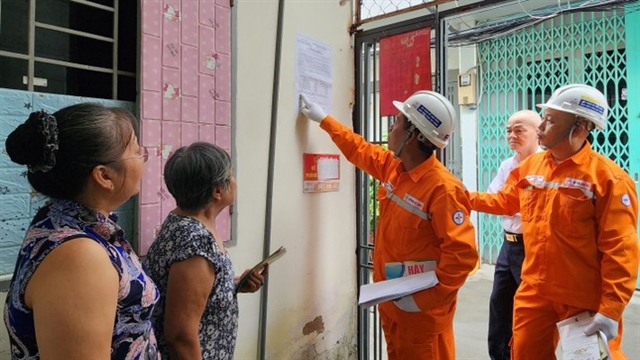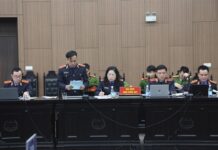Mr. Bui Trung Kien, Deputy General Director of EVNHCMC, stated that the electricity price for tenants is applied according to Decision No. 2699/QD-BCT dated October 11, 2024. The electricity quota allocation for tenants follows current regulations.

EVNHCMC staff promoting electricity policies to the public
|
According to Clause 4, Article 10 of Circular No. 16/2014 by the Ministry of Industry and Trade: In the case of renting to a household, the landlord directly signs the electricity sale contract or authorizes the tenant household to sign the contract (with a commitment to pay the electricity bill). Each tenant household is allocated one quota.
For renting to students and workers (where the tenants do not form a household), according to Clause 2, Article 2 of Circular No. 09/2023/TT-BCT, the electricity quota for students and workers is specified as follows: If the rental contract is for 12 months or more and the tenants have temporary or permanent residence registration (based on residence information at the electricity usage location), the landlord directly signs the electricity sale contract or authorizes a tenant representative to sign (with a commitment to pay the electricity bill on behalf of the landlord). If the rental period is less than 12 months and the landlord cannot fully declare the number of electricity users, the third-tier retail electricity price for household use shall be applied: From 101 – 200 kWh (the unit price according to Decision 2699/QD-BCT is 2,271 VND/kWh excluding VAT) for the total measured electricity output at the meter.
If the landlord can fully declare the number of electricity users, the electricity seller is responsible for allocating quotas to the landlord based on residence information at the electricity usage location. Every four (4) people are considered one household for electricity usage quota calculation; specifically, one (1) person is counted as 1/4 of a quota, two (2) people as 1/2, three (3) people as 3/4, and four (4) people as one full quota. For one household (equivalent to four tenants), the electricity quota is one, with the first-tier usage of 50kWh/month. For one tenant (1/4 of a household), the first-tier usage is 12.5kWh/month.
 Public display of electricity prices for tenants in Ho Chi Minh City |
In the past, EVNHCMC has also strengthened the communication and guidance on regulations related to electricity quota calculation for workers, students, and tenant workers. They have publicly posted electricity prices for students and tenant workers at their offices and customer service centers. They also use the customer care application to notify tenants about regulations, procedures, and methods for calculating electricity quotas for tenants. EVNHCMC provides a hotline number, email, fanpage, and website for their Customer Care Center, enabling customers to access information about electricity prices for tenants 24/7.
The electricity companies have also coordinated with the People’s Committees of wards, communes, and towns to inspect landlords of rental housing to ensure that they comply with the supportive electricity prices for tenants.
|
Any individual who collects electricity charges from tenants at a higher rate than the state-announced price shall be administratively sanctioned according to Clause 6, Article 12 of Decree No. 17/2022/ND-CP dated January 31, 2022: A fine ranging from VND 20,000,000 to VND 30,000,000 shall be imposed on the landlord who collects electricity charges from tenants at a higher rate than the prescribed price in the case of purchasing electricity at retail prices for household, production, business, and service purposes. To register for a household electricity quota, tenants and landlords can contact the hotline 1900 545454, visit the customer care website https://cskh.evnhcmc.vn/GiaoDichTrucTuyen/dichvudien/thayDoiDMucSDungDien, or use the EVNHCMC mobile application to have a quota allocated. |
The New Social-Economic Policy: Unveiling September 2024’s Dynamic Strategies
September 2024 sees a host of notable policies come into force, impacting the economic and social landscape. These new regulations are designed to bring about positive change and development, but what do they mean for businesses and individuals? This month, a range of new laws are being implemented, each with its own unique impact. From changes to financial procedures to social initiatives, these policies are set to leave their mark.



















